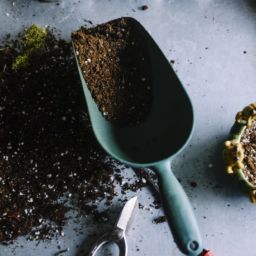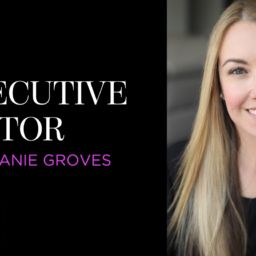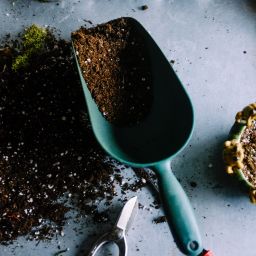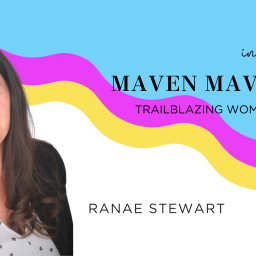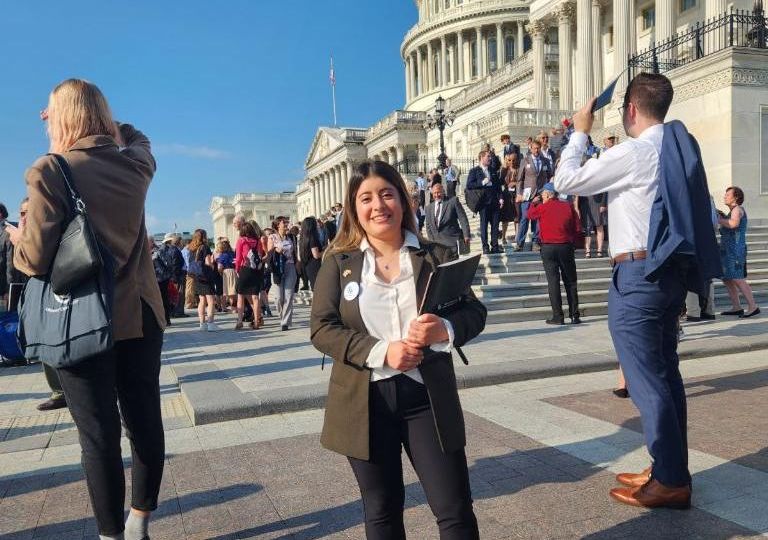
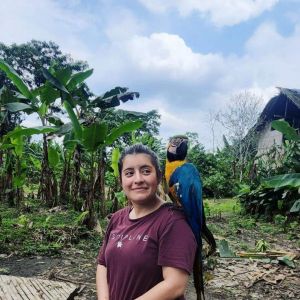
Growing up in Quito, Ecuador, Pamela Guerrero was surrounded by the overwhelmingly beautiful nature of the Amazon.
“We would go to the mountains, the Andes… we would watch the transition of seasons and changing weather patterns driving up the coast to the highlands, enjoying the fog over the mountains and the waterfalls of Ecuador—so beautiful and so tall.”
Ecuador remains home to several native tribes, adding up to an estimated 1.1 million Indigenous people living in the country. Pamela was influenced by the beauty of Ciudad Mitad del Mundo (Middle of the World City) and impacted by watching the native tribes continue to keep their cultures’ traditions alive.
“Traditional practices are born and stay alive in the Amazon. Seeing how native people lived surrounded by that beauty their whole lives…It’s just amazing,” she said.
Holding Mother Earth and Indigenous peoples close to her heart, Pamela was significantly impacted when she learned about Aguinda v. Texaco, Inc., a class-action lawsuit against Texaco Petroleum filed on behalf of indigenous collectives in the Ecuadorian Amazon.
La Mano Sucia de Chevron—The Dirty Hand of Chevron
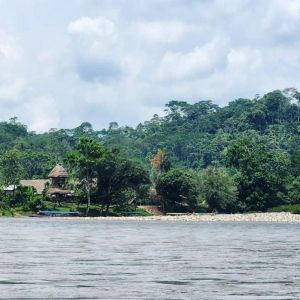 From 1964 to 1990, Texaco (later acquired by Chevron) dumped more than 16 billion gallons of toxic wastewater, spilled roughly 17 million gallons of crude oil, and left hazardous waste in hundreds of open pits dug out of the forest floor of the Ecuadorian Amazon.
From 1964 to 1990, Texaco (later acquired by Chevron) dumped more than 16 billion gallons of toxic wastewater, spilled roughly 17 million gallons of crude oil, and left hazardous waste in hundreds of open pits dug out of the forest floor of the Ecuadorian Amazon.
The pollution contaminated 2 million acres of the Amazon with toxic chemicals that mainly affected indigenous people and poor farmers. Many have reported cancer, miscarriages, skin conditions, and birth defects as a result of exposure to the pollution. Pamela shared that locals refer to this as La Mano Sucia de Chevron—The Dirty Hand of Chevron.
After 18 years of legal battles, a coalition of tribes and environmental defenders won $9.5 billion in damages in court, but the oil giant refuses to pay. In the words of one Chevron official: “We will fight this until hell freezes over, and then fight it on the ice.”
While sharing the details of the case, Pamela became noticeably emotional as she said, “Seeing the injustice of [corporate] money saying that people’s lives in Ecuador are not nearly as valuable… and the lack of holding corporations accountable for their actions, especially in the Southern global countries.”
This lit a fire in her belly to pursue environmental work in her career.

Motivated to make an impact
Intent to work in the international community to find ways to hold corporations accountable, Pamela left her family in Ecuador to emigrate to the U.S. to study international relations. She ended up in Indiana, attending the University of Indianapolis and earning a BA in Political Science with a minor in International Relations.
She earned her American citizenship in 2022 and is currently working on her master’s in Public Affairs with a concentration in Environmental Policy and Sustainability at Indiana University Indianapolis.
Pamela has invested a significant amount of time supporting environmental nonprofits. For a year, she worked for the Citizens Action Coalition (CAC), Indiana’s oldest and largest consumer and environmental advocacy organization. She advocated on behalf of Hoosiers on issues regarding energy policy, utility reform, health care, pollution prevention, and family farms. Pamela continues to support the organization by volunteering as vice president of its board of directors.
She also volunteers as a steering committee member for the Citizens Climate Lobby (CCL), a nonprofit, nonpartisan, grassroots advocacy climate change organization focused on national policies to address the national and global climate crisis. CCL hosts chapters in all 50 states and is one of the only citizen-driven lobbying organizations representing citizens in front of Congress.
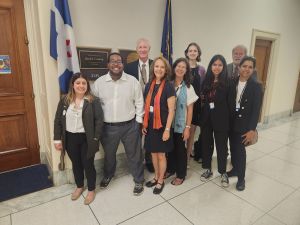
As a leader with the CCL Congressional lobbying group, Pamela traveled to Washington, D.C., to meet with lawmakers in 2023, acting as the primary liaison for Indiana’s 7th District, organizing, training volunteers, and writing the entire lobbying script. “As a foreigner, teaching Americans how to embolden themselves to advocate for themselves with their local government, gives me so much joy,” she proudly shared.
Pamela is intent on making positive change wherever she goes and would like to make an impact internationally.
When describing looming environmental challenges, she shared, “As the U.S. transitions to clean energy, we’re likely to see the same negative environmental impacts that we saw from the industrial revolution—Mining and pollution that happened to countries like Ecuador, due to the need for taking resources from the Earth to build infrastructure and technology.”
What Pamela wants Mavens to know on Earth Day
Where you can stay informed:
- Follow local nonprofits such as the Citizens Action Coalition and the Citizens’ Climate Lobby of Indiana.
- CCL empowers everyday people to engage in lobbying efforts and collaborate to shape climate policies. Find their 2024 Chapter Meetings, Community Events and Educational Event Schedule.
- Check out Voters for a Green Indiana, a nonpartisan group that provides education about political candidates’ environmental views.
How you can be a more environmentally friendly consumer:
- Avoid single-serving food items to reduce plastic usage.
- Bring your own reusable bag to the grocery store.
- Check beauty products to confirm if they are a B-Corp (it’s right on the bottle), which certifies that they operate their business in socially responsible and environmentally friendly ways.
- Consider reducing plastic waste with your laundry and cleaning products by using brands like Dropps or Blueland.
All of our content—including this article—is completely free. However, we’d love it if you would please consider supporting our journalism with a Maven Membership.




